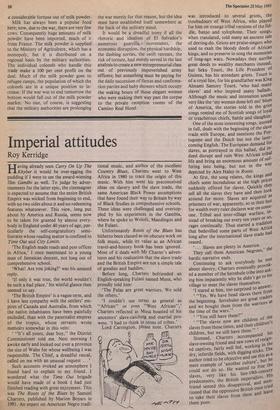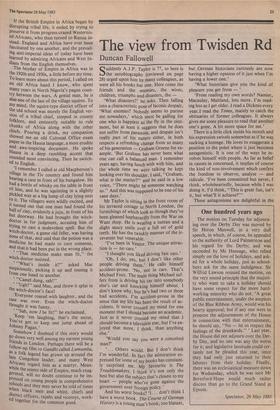Imperial attitudes
Roy Kerridge
Having already seen Carry On Up The Khyber it would be over-egging the pudding if I were to see the award-winning film Gandhi as well. To judge by adver- tisements for the latter epic, the cinemagoer is expected to assume that the entire British Empire was wicked from beginning to end, with no two sides about it and no redeeming features whatsoever. This view, long put about by America and Russia, seems now to be taken for granted by almost every- body in England under 40 years of age, par- ticularly the self-congratultory semi- literates whose reading matter is confined to Time Out and City Limits.
`The English made roads and post offices in Africa,' I once mentioned to a young man of Jamaican descent, not long out of comprehensive school.
'What! Are you joking?' was his amazed reply.
`If only it was true, the world wouldn't be such a bad place,' his wistful glance then seemed to say.
`The British Empire' is a vague term, and I have less sympathy with the settlers' em- pires of Canada and Australia, from which the native inhabitants have been painfully excluded, than with the paternalist empires of the tropics, whose servants wrote memoirs somewhat in this vein: ` "It's all yours, dear boy," the District Commissioner told me. Next morning I awoke early and looked out over a province the size of Wales for whose wellbeing I was responsible. The Chief, a dreadful rascal, called on me with an unusual request ... '
Such accounts evoked an atmosphere I found hard to explain to my friend. I wondered what the Time Out brigade would have made of a book I had just finished reading with great enjoyment. This was The Roots of the Blues by Samuel Charters, published by Marion Boyars in 1981. An expert on American Negro tradi- tional music, and author of the excellent Country Blues, Charters went to West
Africa in 1980 to trace the origin of this music. With him went his preconceived ideas on slavery and the slave trade, the same American Black Power assumptions that have found their way to Britain by way of Black Studies in comprehensive schools.
These ideas were challenged and overtop- pled by his experiences in the Gambia, where he spoke to Wolofs, Mandingos and the Fulani.
Unfortunately Roots of the Blues has hitherto been classed as on obscure work on
folk music, while its value as an African travel-and-history book has been ignored. Most of it deals with Mr Charter's adven- tures and his realisation that the slave trade and the British Empire are not a simple tale of goodies and baddies.
Before long, Charters befriended an English-speaking Fulani named Musa, who proudly told him: `The Fulas are great warriors. We sold the others.'
`I couldn't use terms as general as "African" or even "West African" ,' Charters reflected as Musa boasted of his ancestors' slave-catching and martial pro- wess. 'I had to think in terms of tribes.'
Lord Carrington, please note. Charters
was introduced to several griots, the troubadours of West Africa, who played for him on strange tribal versions of the fid- dle, banjo and xylophone. Their songs, when translated, told many an ancient tale
of derring-do. Griots are praise-singers who used to exalt the bloody deeds of African kings, and so preserve in song the memories of long-ago wars. Nowadays they ascribe great deeds to wealthy merchants instead, but Seku Toure, the Life President of Guinea, has his attendant griots. Toure is of a royal line, for his grandfather was King Almami Samory Toure, 'who had many slaves' and who inspired many ballads. Although the music and intonation sound very like the 'my woman done left me' blues of America, the stories told in the griot songs remind me of Scottish songs of loyal or treacherous chiefs, battle and slaughter.
One of the most interesting songs, quoted in full, deals with the beginning of the slave trade with Europe, and mentions the Por- tuguese and the Dutch but not the later- coming English. The European demand for slaves, as portrayed in this ballad, did in- deed disrupt and ruin West African tribal life and bring an enormous amount of suf- fering into being, but not in the way depicted by Alex Haley in Roots. At first, the song relates, the kings and chiefs seem incredulous at the high prices suddenly offered for slaves. Quickly they sell all the slaves they have and then look around for more. Slaves are acquired as prisoners of war, apparently, so in their lust for wealth every ruler declares war on some- one. Tribal and inter-village warfare, in- stead of breaking out every ten years or so, rages continually. Thus started a tradition that bedevilled some parts of West Africa long after the international slave trade had ceased.
... Slaves are plenty in America. They callnarrative ends. American Negroes,' the ha Continuing to ask everybody he ovomet about slavery, Charters eventually prk- ed a member of the Serrehule tribe into ask- ing him impatiently why he didn't go to his village to meet the slaves themselves. `I stared at him, too surprised to answer. "Yes. We have head slaves there from the beginning. Serrehules are great traders the and time weboof the wars.wthaersm.,,from the warriors a "You still have them?"
"The slaves now are children of the slaves from those times, and their children's children, but we still have them."
Stunned, Charters accompanied his slave-owning friend and saw rows of resign e ed captives, fairly well fed, working in _ nhe dry, infertile fields, with digging sticks. Tsa author tried to be objective and see this as mere example of 'another culture', but he e could not do so. He wanted to free it; slaves, very like his late-19th-centu predecessors, the British imperialists. His friend sensed this disapproval, and in tioned that the oppressive British once tried them poor.slaves from them and leave hni
If the British Empire in Africa began by disrupting tribal life, it ended by trying to preserve it from progress-crazed Westernis- ed Africans, who then turned to Russia in- stead. England and Africa have ever been fascinated by one another, and the prevail- ing anti-imperial ideas of today have been learned by admiring Africans and West In- dians from the English themselves. The heyday of Empire in Africa was in the 1920s and 1930s, a little before my time. To learn more about this period, I called on an old Africa hand I know, who spent many years in North Nigeria's pagan coun- try between the wars. A genial man, he is also one of the last of the village squires. To mY mind, the squire-type district officer of the old school was merely the English ver- sion of a tribal chief, steeped in county folklore, and eminently suitable to rule chunks of Africa along with the other chiefs. Pouring a drink, my companion showed me an old Colonial Office exam Paper in the Hausa language, a most erudite and awe-inspiring document. He spoke Hausa in a deep rumbling accent that sounded most convincing. Then he switch- ed to English.
`I remember I called at old Macpherson's village in the Tiv country and found him hearing a case in front of his bungalow. He had a bottle of whisky on the table in front of him, and he was squinting in a slightly Pickled way at a big lump of clay lying next to it. The villagers were wildly excited, and it turned out that one man had found the ball of clay, evidently a juju, in front of his but doorway. He had brought the witch- doctor in for judgment, accusing him of trying to cast a malevolent spell. But the witch-doctor, a game old feller, was having none of that, and said that the potion was a medicine he had made to cure someone, and that it had been put in the wrong place. ` "That medicine make man fit," the witch-doctor insisted. "What's inside it?" asked Mac suspiciously, picking it up and tossing it from one hand to another.
"Camel dung, sag" "Ugh!" said Mac, and threw it splat in the witch-doctor's face!
`Everyone roared with laughter, and the ease was over. Even the witch-doctor thought it was funny.
"Sah, now / be fit!" he exclaimed. Keep 'ern laughing, that's the secret. You've got to keep one jump ahead of Johnny Pagan.'
Somehow I doubted if this story would go down very well among my earnest young friends in London. Perhaps there will be a follow-up film to Gandhi called Lumumba, as a folk legend has grown up around the late Congolese leader, and many West Africans regard him as a martyr. Mean- while the seamy side of Empire, much exag- gerated, will no doubt continue to be im- pressed on young people in comprehensive schools and they may never be told of times when black men and white, chiefs and district officers, rajahs and viceroys, work- ed together for the common good.















































 Previous page
Previous page